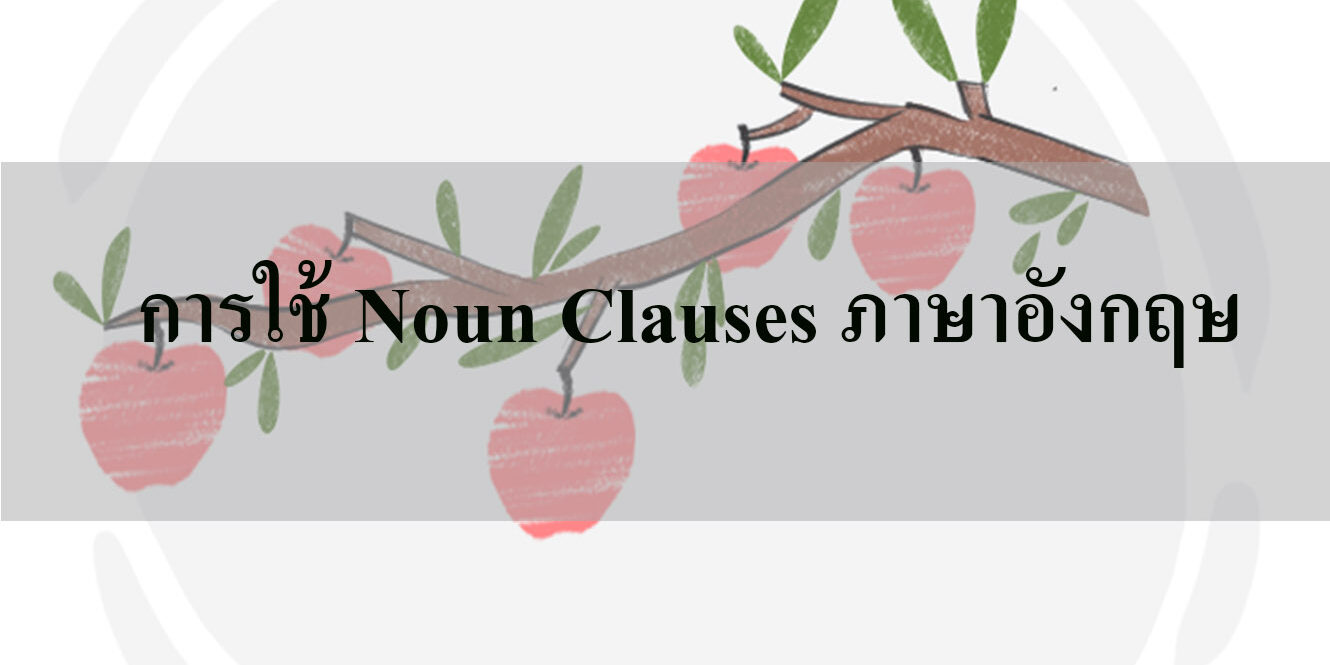หลักการใช้ Noun Clauses
Noun Clauses คืออนุประโยค ซึ่งทำหน้าที่เป็นคำนามในประโยค เป็นได้ทั้งประธาน (Subject noun clauses) หรือกรรม (Object noun clauses
2.1 Quoted Speech และ Reported Speech
Direct Speech คือ การยกคำพูดจริงๆของผู้พูดทั้งหมดมาเล่าให้ฟังโดยไม่เปลี่ยนแปลง โดยอาศัยการนำคำพูดนั้นมาไว้อยู่ในเครื่องหมายคำพูด (Quotation Marks “…”) โดยมี comma (,) คั่นกลางระหว่างประโยคที่ยกมาพูดถึง และ ประโยคหลัก โดยประธานที่อยู่ในเครื่องหมายคำพูดจะต้องเป็นตัวใหญ่เสมอ
|
Direct Speech |
Indirect Speech |
|
Present simple Tense |
Past simple Tense |
|
Present continuous Tense |
Past continuous Tense |
|
Past simple Tense |
Past perfect Tense |
|
Past Continuous Tense |
Past Perfect Continuous Tense |
|
Present perfect Tense |
Past perfect Tense |
|
Future simple Tense (will) |
Future in past forms Tense (would) |
|
Can |
Could |
|
May |
Might |
|
Shall |
Should |
|
Must |
Had to |
|
Direct Speech |
Indirect Speech |
|
ago |
before, earlier |
|
a year/month ago |
a year/month before, the previous year/month |
|
last… (night/week/moth/year) |
the…before, the previous… |
|
next… (night/week/moth/year) |
the following…, the…after |
|
now |
then, at that time |
|
the day before yesterday |
two days before |
|
the day after tomorrow |
Later in two days time, two days late |
|
today |
that day |
|
tomorrow |
the following day, the next day |
|
tonight |
that night |
|
yesterday |
the day before, the previous day |
2.2 Noun Clauses ที่ขึ้นต้น Wh-Words หรือ Question Words
- Noun Clauses ที่ขึ้นต้นด้วย Wh-Words มีชื่อเรียกอีกอย่างหนึ่งว่า Indirect wh-questions และแม้ว่า noun clause เหล่านี้จะขึ้นต้นด้วยคำแสดงคำถาม แต่ลำดับคำ (word order) ในอนุประโยคนี้ จะเป็นลำดับคำของประโยคบอกเล่า ไม่ใช่ลำดับคำของประโยคคำถาม
เช่น I know why she comes home very late.
(ไม่ใช่ why does she come home very late)
I don’t know when she will arrive.
(ไม่ใช่ when will she arrive)
- การใช้เครื่องหมายวรรคตอนของประโยคจะเป็นไปตามลักษณะของ main clause กล่าวคือ ถ้า main clause เป็นคำถามจะใช้เครื่องหมาย question mark ปิดประโยค ถ้า main clause เป็นบอกเล่า จะใช้เครื่องหมาย full stop ปิดประโยค
เช่น Could you tell me where the elevators are?
(Main clause เป็นคำถาม)
I’m wondering where the elevators are.
(Main clause เป็นบอกเล่า)
- ใช้ Noun Clauses ที่ขึ้นต้นด้วย Wh-Words เพื่อแสดงให้คู่สนทนาทราบว่า เราไม่รู้ หรือเราไม่แน่ใจ
เช่น I don’t know how much it costs.
I would like to know when our next meeting will be.
I’m not sure which house is his.
- ใช้ Noun Clauses ที่ขึ้นต้นด้วย Wh-Words เพื่อถามหาข้อมูลอย่างสุภาพ.
เช่น Could you tell me who are injured in the accident?
2.3 Noun Clauses ที่ขึ้นต้นด้วย If, whether
การใช้ Noun Clauses ที่ขึ้นต้นด้วย if หรือ whether มีหลักเกณฑ์ดังนี้
- Noun Clauses ที่ขึ้นต้นด้วย if หรือ whether คือ indirect yes/no questions นั่นเอง
เช่น Direct Question: Did they pass the exam?
Indirect Question: I don’t know if they passed the exam.
(ข้อความที่ขีดเส้นใต้คือ noun clause ที่ขึ้นต้นด้วย if นั่นเอง)
- ลำดับคำในประโยค (word order) และเครื่องหมายจบประโยค ใช้หลักเกณฑ์เดียวกับ Noun Clauses ที่ขึ้นต้นด้วย Wh-Words
- จะขึ้นต้น Noun Clauses ด้วยคำว่า if หรือ whether ก็ได้ แต่มักใช้ whether ในสถานการณ์ที่ค่อนข้างเป็นทางการ
เช่น Sir, I would like to know whether you prefer coffee or tea.
Tell me if you want to go with us or not.
- ใช้ Noun Clauses ที่ขึ้นต้นด้วย if หรือ whether เมื่อ main clause แสดงการใช้ความคิด หรือความคิดคำนึง
เช่น I can’t remember if I had already paid him.
I wonder whether he will arrive in time.
- ใช้ Noun Clauses ที่ขึ้นต้นด้วย if หรือ whether เมื่อต้องการถามคำถามอย่างสุภาพ
เช่น Do you know if the principal is in his office.
Can you tell me whether the tickets include drinks?






